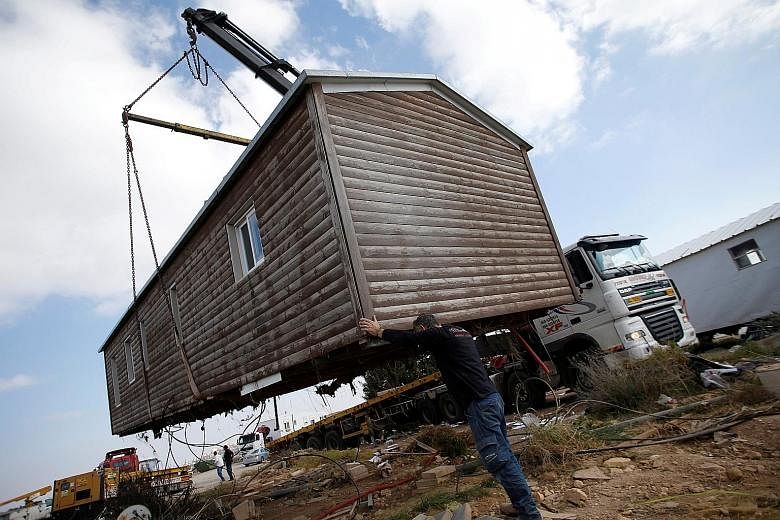JERUSALEM • Israel's government has approved the construction of a new Jewish settlement in the West Bank for the first time in 20 years, despite fierce opposition from the Palestinians and a recent request from the White House to hold back on settlement activity.
The move, which was unanimously approved by the Security Cabinet and is waiting a final go-ahead from the wider Cabinet, is meant as compensation for the settlement of Amona, which was demolished more than a month ago after Israel's Supreme Court ruled that it was built on land privately owned by Palestinian farmers.
Prime Minister Benjamin Netanyahu had previously pledged to build a new settlement for the 40 Amona families evicted in February. "I promised to create a new community and we are going to respect that commitment and create it today," he said ahead of Thursday's Security Cabinet meeting.
If the plan goes ahead, it would go against a request by President Donald Trump in February for Israel to "hold back" on settlements until an understanding is reached between the two governments on the issue.
A team of Israeli officials, led by Israel's Ambassador to the United States, Mr Ron Dermer, met last week with Mr Jason Greenblatt, Mr Trump's special representative for international negotiations, to find a solution. The talks, however, ended in a stalemate, with the White House expressing its "concerns" about settlement construction.
Israel's settler movement has expected Mr Trump to be more supportive of its goals to expand its communities in the West Bank after eight years of restrictions during the Obama administration.
Mr Greenblatt has expressed the Trump administration's interest in restarting the stalled peace process between both sides. But a new Israeli settlement could make achieving that goal even harder. Mr Greenblatt visited the region last month, meeting Mr Netanyahu and Palestinian President Mahmoud Abbas.
According to Israeli human rights group B'Tselem, roughly 125 settlements have been built on land Israel occupied after the 1967 war with Jordan. Israel has continued to build additional housing units in those settlements over the years. Also, there are a further 100 outposts, or small communities, viewed as illegal even by the Israeli government.
Palestinians oppose the existence of Israeli settlements, seeing them as an expansion of Israel into territory they hope will one day be part of a Palestinian state.
Much of the international community views Israeli settlements as illegal.
"Israel's relentless efforts to expand its illegal settlement enterprise, with the aim of displacing Palestine and replacing it with 'Greater Israel', should send a strong message to governments worldwide that they need to intervene immediately and to undertake concrete measures to hold Israel accountable with serious punitive measures," said Ms Hanan Ashrawi, a Palestine Liberation Organisation executive committee member.
The anti-settlement non-governmental organisation Peace Now said the announcement of the new settlement showed that the government was leading Israelis and Palestinians towards "apartheid".
WASHINGTON POST, AGENCE FRANCE-PRESSE

